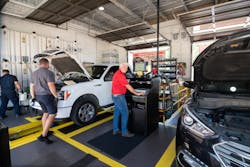We've all been there one time or another. The day is going along fine and then a wrench is thrown into the works. "The best-laid plans of mice and men often go awry," or more simply put, no matter how carefully we may plan, something could go wrong. Though it is impossible to see every problem that may come along, a business leader knows that panicking is never an option.
Instead, it is time to think like a Marine—consider how to improvise, adapt and overcome.
"Some significant and successful moments of my adult life in the fast lube business in some ways evolved from quick-on-your-feet moments," explains Pete Frey, shop owner of Take 5 Oil Change in Covington, Louisiana.
"Situations like that helped us define our model, what services we wanted to perform and not," Frey tells NOLN. "Some experiences slowed us down, but we learned and pushed on toward the best version of ourselves and our model and from those experiences, we refined and shaped our model."
Even as the leader, Frey also says that he knew to call in the talents of his team of all-stars, and in this case, he has asked them to weigh in and share their thoughts on how a shop can keep things rolling smoothly when things simply don't go as planned.
The Challenge
The business model for most fast lube operators is to provide a quality service to the customer as quickly as possible. The industry is built on this model, and most days, the business of the shop will run smoothly. Then, there are those days when something happens.
Suddenly it isn't a normal day, and it is time to hit the "don't panic" button.
"The unexpected is something you don't expect, honestly, but it certainly can impact your workflow and change the experience for every customer in the shop if you're unprepared," warns Blake Dunaway, Take 5 Oil Change's training manager, who has lived through plenty of those days.
"We've all been there. Summer heat, 1 p.m. lunch rush, cars stacking out the bays and maybe onto the drive," says Dunaway. "Any myriad of things could happen and today the threads came out of an oil pan. At this moment there are so many things to take into consideration. How is this customer feeling about the situation and what are you going to do to fix the car? The customers behind them are now waiting in the summer heat. The flow of great service and fast oil changes has now stopped and for a split second you are at a standstill."
This is when the team needs to improve, adapt and overcome.
Gather the team, and consider how you can tackle the obstacles at hand, one by one based on the immediate first. Like a great coach or a platoon leader, you need to position the staff where they need to be. Keep moving forward, and don't panic.
Customers never want to see panic. A problem doesn't stop the clock, it doesn't stop the day—just needs to be addressed.
The Solution
In wartime, men and women might win medals following such high-pressure moments, while in sports there are MVP trophies. For the fast lube team there likely aren't such recognitions, but keeping the workflow going and the customers happy is the clear path to that day's victory.
The first consideration may be whether the risk even outweighs the reward. No shop can stock everything—especially today—so when a Lotus or Ferrari rolls up, maybe you can't take on the job.
"We all try to meet our customer's needs but sometimes it's like running against the wind. Availability of parts, logistics, supply shortages, trucking and basic transportation problems are only exasperating things," Dunaway explains.
Yet, because of those supply chain bottlenecks, even seemingly "common" parts can be in short supply.
"We attempt to carry what makes sense according to inventory turns while targeting the type of vehicles we service frequently," adds Take 5 Oil Change's shop manager James Hodge.
"If we run into a situation where we do not have the customer's oil filter, we have a few options," he says. "One; we would call our local parts store and get one from them ASAP. If they have the filter in stock because they are so close, they will bring it to us. On some occasions, we may send a staff member over to them pronto, while we start the service on the customer's vehicle."
Regardless of whether something broke during service or the shop lacks a part to get the job done quickly, communication should absolutely be part of the solution.
Customers shouldn't guess why a job is taking too long, because they may come to think that it is business as usual and you've instantly lost a potential repeat client. Instead, be direct, explain the situation; and sometimes, the customer may be told they'll have to wait.
It happens, and in the new post-pandemic new normal most people understand the situation.
"In worst-case scenario if our local auto parts stores do not carry the filter, we will write the filter number down with the customer's information, order it from our main distribution source, or a back-up if needed then call the customer as soon as we receive it," says Hodge.
To ensure that the work-flow isn't disrupted, it may be necessary to even move a vehicle from the bay. But always keep a professional decorum and positive perception, which can go a long way in gaining the respect of all of the customers.
The Aftermath
You win some; you lose some. Either way, the sun will still come up tomorrow, and such bad days should be considered valuable life lessons, and learning experiences. In addition, these moments should be discussed by the staff to determine what may have gone wrong, and how not to repeat past mistakes.
"Our crew works similarly to a football team," says Trent Wood, the shop's assistant manager, who has also earned a reputation for being the "king of calm."
Here is where every "Monday morning quarterback" and "armchair general" can get a say in the future strategy.
"Although we hope every service goes without issue, the occasional hiccup is inevitable," Wood adds. "We steer our senior technicians and management team on the vehicle's we know are difficult or require special care to perform the service properly. We also do not miss an opportunity to teach and coach the staff up."
The Takeaway
Again use those bad times and even missteps as future teachable moments. This can include coming up with new procedures that may not have been previously considered, while you also know what to avoid.
This can include determining who is the best-inclined technician for a particular problem, suggests Take 5's general manager Doug Bell, who adds, "The manager on duty should make the customer aware and comfortable."
Following such problems, all employees will know how to respond in the future. That can further include communication with the customer, and letting them know your plan to resolve a problem. Moreover, anything you've encountered once can be used as a precedent for similar issues. It can also help shops prepare a checklist of what to do as well as what not to do.
In addition, seeing that you can resolve even a serious problem can help instill customer confidence that they've chosen the right shop to do the work.
"Remember the importance of your shop culture, which dictates the customer perception of your business and your staff," says Frey. "Your customers have a lot to gain if we achieve excellence as an industry."






